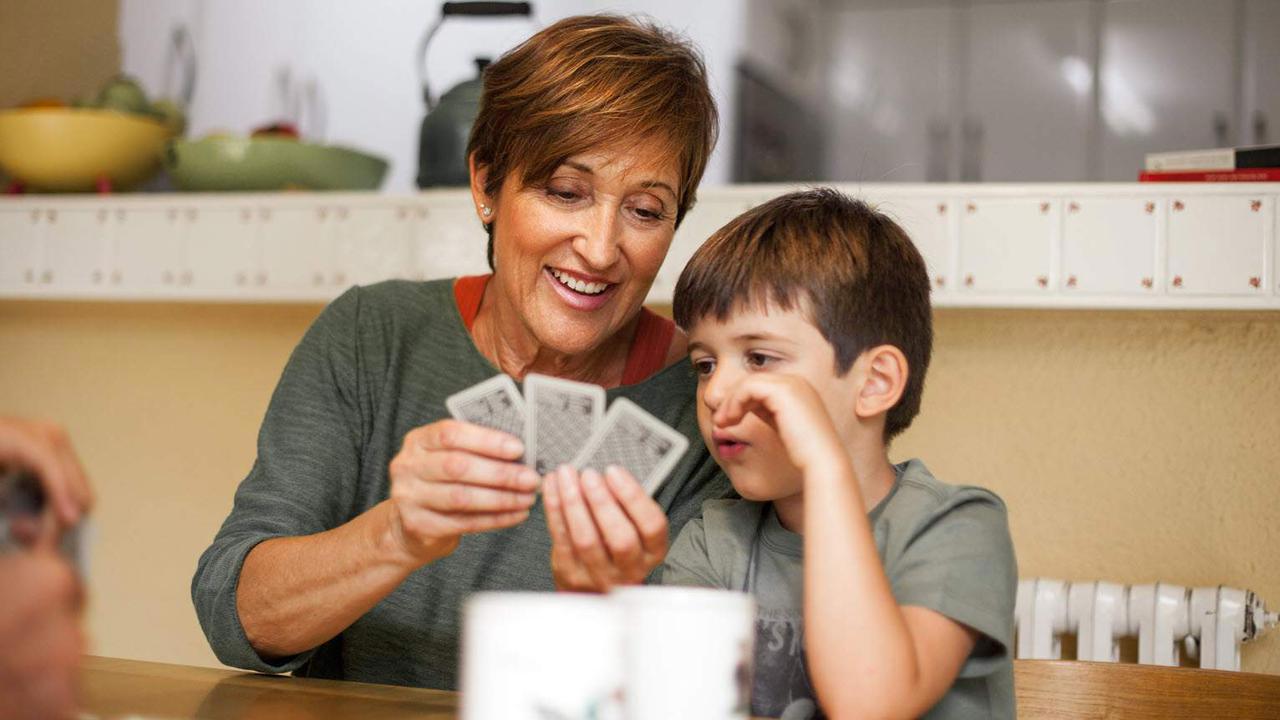
Your preschooler doesn’t need a Poker face to reap the rewards of playing cards.
Standard packs and specialty games open up opportunities to identify colours, shapes and numbers, develop hand dexterity, take turns, stay focused, make decisions, follow rules and be a good loser.
Depending on the game, your preschooler might need snappy reflexes or a solid memory to ace a friendly competition. Plus, there’s the good old-fashioned benefit of screen-free family time.
Card games are a winning way to bring siblings, parents and grandparents together, and once your preschooler gets the hang of a game, they might not want to stop!
To kick things off, here are 8 card games that bring fun and learning to the table.
Standard 52-card pack games
Snap – ages 3+
Snap is a classic game of winner takes all, and it involves players discarding a card, one-by-one, into a central pile. The first player to notice two matching cards yells, “Snap!” and wins the pile.
Play continues until all cards are won, and along the way, your preschooler practises their visual discrimination – which allows them to distinguish a three of spades from a three of clubs, and sets them up for reading and writing success.
Concentration (or Memory) – ages 3+
As its names suggest, this game is all about focus and remembering, and it also encourages number and symbol recognition.
Once the deck is shuffled and all cards are spread face-down on the table, gameplay is a cinch. Players take turns flipping over two cards at a time. If you get a match, the pair is yours. Non-matches are flipped back over, and the player with the most pairs at the end wins.
Go Fish – ages 4+
This game ups the ante with card-holding. Players are dealt five or seven cards, and take turns asking if another player has a card type they need to make a match. For example, if they hold a three, they’ll say, “Daddy, please give me your threes.”
If Daddy has one or more threes, he hands the card/s over for all to see, and the ‘catcher’ gets to fish for another card from him or someone else. As long as they’re catching, they can keep fishing.
If Daddy doesn’t have a three, he says “Go Fish!” and the non-catcher draws a card from the central pile.
Usually, you have to match four cards to win a ‘book’ and the player with the most books on the table wins the game, but matching pairs gives your preschooler more chances to hook some books before the cards run out.
Old Maid – ages 4+
This game royally challenges your preschooler’s matching, pairing and number-recognition skills, and teaches them to lose with grace.
First, a Queen is removed from the pack. The deck is then dealt out, and players look for pairs in their hands. All pairs are put down on the table, and if you have three-of-a-kind, two of them go down.
Everyone then takes turns inviting the player on their left, then right, to choose one card from their hand (sight unseen). Pairs are put down as they happen, and play continues until all the cards have been paired, and one unlucky player is left holding the Old Maid.
Silly Monkey is a modern take on Old Maid, and all the classic games have been rebooted, so you can play them with custom-designed decks.
Specialty card games
UNO junior – ages 3+
UNO is an enduring favourite for schoolkids, and this version simplifies the gameplay for under fives. Your child has to match classic UNO colours and new numbered animals, and the game won’t get boring, because it has three skill levels in one pack.
Heads Talk, Tails Walk – ages 3+
This gigglesome game develops your preschooler’s visual perception and reasoning skills as they match card halves, but mostly, it’s a great excuse to make silly animal sounds and movements when the head and tail cards don’t match. Giddy-up, horse-monkeys!
Zingo! Bingo with a Zing – ages 4+
Zingo! is a genius way for your pre-reader or early reader to learn sight words. A bingo machine dispenses picture and word tiles, and the winner is the first player to fill their challenge card with the matching tiles and yell, “ZINGO!”.
Spot it! Animals Jr. – ages 4+
Spot it! games think outside the square with round cards, and this junior version exercises your child’s observational and cognitive skills as they play zoo-seeker for a day. Your preschooler has to focus on finding each animal’s one true match, and they’ll encounter new game modes and animal names as they play.
Woolworths, EdResources, Amazon and other toy and game retailers stock these card games, and here, we bring you the best board games for kids.
Fun and games are also a big part of the child care day and Toddle can help you find a great spot for your child.